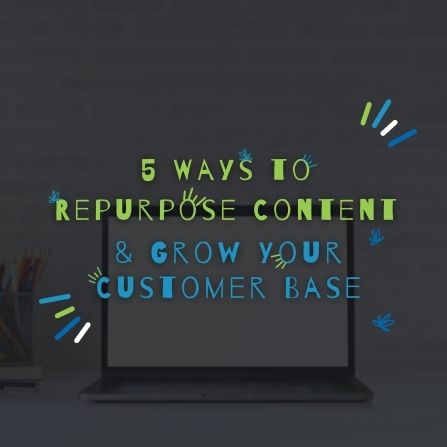
The best thing about the content that companies create is that it can be consumed in many different ways. The written (or typed) word, video, audio, and other outlets like AR and VR technology make it possible to take an original type of content you’ve created and change it for a completely different method of consumption. Basically, you are reusing the content that you already made and putting it back out there in less time. This helps your business get more value out of your investment while also enabling its distribution to various channels where it can reach a new, broader audience.
The Criteria of Repurposing Content
Before you start you want to make sure you’re not flying by the seat of your pants for the sole purpose of creating “new “content. For example, what are your goals for repurposing? Do you want to reach a new audience? Do you want to spend less time creating something brand new? Are you interested in developing a new distribution channel?
These are the questions that will give you a sense of direction and once you’ve decided on this, you want to understand the intricacies of these channels. For example, if you want to create video content from a blog post you need to understand how the audience of this platform reacts and what they’re looking for. Finally, determine whether your content really needs to be repurposed. Although it may perform well as an article on your blog, it doesn’t mean that its success will correlate with evergreen video content.
Now that we’ve covered the criteria for repurposing content, let’s discuss the different ways to making your content shine.
- Video
Converting a blog that you’ve written into a video is an incredible way of targeting a broader audience that wants to consume your content already. It does require more work to begin with but the reach on platforms like YouTube makes it an excellent way to share your message initially.
Once you have this content up and available, you may be tempted to share it as it is, but don’t get caught up with sharing your new audio-visual masterpiece. Instead, take the video that you put on YouTube and break it down into smaller components. These shorter video formats are perfect for sharing on social media like Facebook and Instagram while also doubling their utility as ads.
If you’re sharing information that discusses a topic your audience cares about, considering sharing the audio portion as a podcast. To think you could recreate all of this content from a single blog post article is astounding, so be creative with it and discover how to distribute it to your audience.
- Social Media Posts
If your business is on Facebook, Instagram, Twitter, and LinkedIn, this is especially useful for you. You can take the same content that you wrote on Facebook and copy and paste it on Twitter. Nice, now you have two pieces of content but let’s add a third. Screenshot your Twitter post that you created and share it on Instagram; this type of content is constantly being consumed by users on the platform so utilize this phenomenon to your advantage.
On LinkedIn, take your screenshot from Twitter and post it with some more added context. LinkedIn loves images that are shared with more information and storytelling is key on the platform so double down on telling your story.
- Email Newsletters
The world is a busy place and even though your content may be amazing, it doesn’t always mean it’ll reach your audience. Take an existing blog post and make it more conversational and to the point, then create a series of emails that you can deliver directly to your mailing list. By doing this, you’re able to still provide valuable information to your customers and prospects without them having to search for your content and leave their inbox. To be clear, don’t paste a link to your content in the email. Instead, deliver it as the content of your newsletter and do it in chunks so that it is easily consumed.

- Infographics
Did you know that people remember 10% of the information they hear out loud VS 65% of the information they see in a visual?
And people following directions with both text and illustrations do 323% better than people following directions
These are incredible pieces of content that are loved by basically everyone.
Why?
They are 30X more likely to be read from top to bottom than a typical blog.
They get 3X the shares than any other type of content on social media
And they are quickly consumed, easy to digest and deliver value all in one place. For visual people in your audience, this form of content is right up there with video and should be part of your repurposing effort.
Many blogs come in the same form as the one you’re reading now so be sure to trim the fat and focus on where the value is created.
Remember, infographics are meant to display information graphically so cut most of the words out; your audience will thank you for it.
- Blog Posts
The last piece of the puzzle, repurpose existing blog posts by updating them to become more relevant. Many high-performing blog posts for your business may have knocked it out of the park years ago, but as time has gone on so has the performance of this content. This is because the information in it is likely outdated and needs a revamp. By updating your blogs by adding and removing different parts, you’re able to recycle your message with data and information that develops authority and shows your audience that you’re delivering value consistently.
Repurposing content can send you off into many directions that provide value to both your company and your audience. Like anything else you do in your business, you want your efforts to be successful and content recycling is no different. We’ve covered the different criteria you need to cover before deciding what to repurpose and the different methods you could use for your efforts. Not only will this help you, but it will help your team and your audience as well. It’s a win-win-win situation that’s great for everyone.
